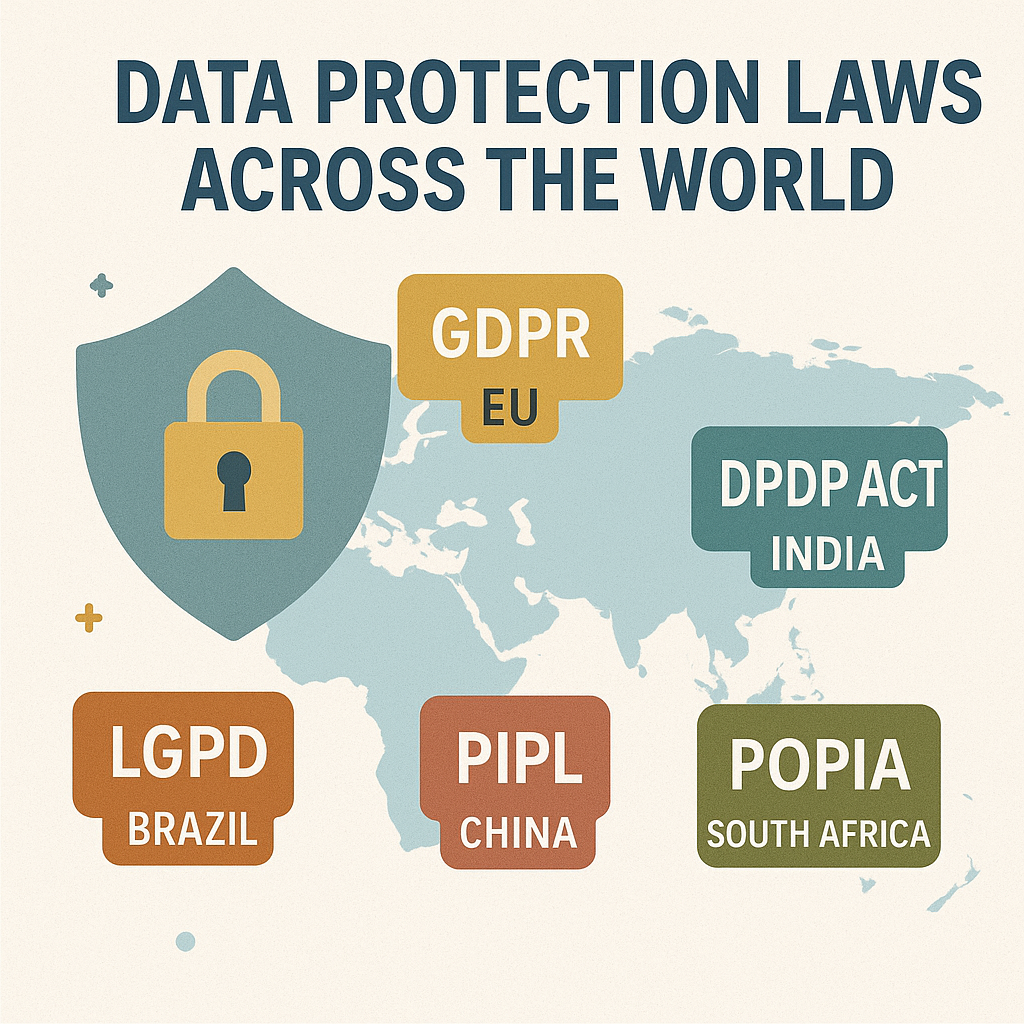As digital footprints grow, nations are racing to define how personal data is collected, stored, and protected — but not all protections are equal.
🌐 Introduction
In the digital age, data is currency — and whoever controls it, holds power. From e-commerce and healthcare to social media and AI, the personal data of billions is constantly harvested. This post compares how different countries approach data privacy, what rights users have, and where global trends are headed in 2025.
🧾 Comparison Table: Global Data Protection Laws
| Country | Law/Framework | Year Enacted | Key Features |
|---|---|---|---|
| 🇪🇺 EU | GDPR | 2018 | Consent-based, right to erasure, DPOs mandatory |
| 🇮🇳 India | DPDP Act | 2023 (in force 2024) | Requires data fiduciaries, consent & penalties |
| 🇺🇸 USA | Sectoral (CCPA, HIPAA, etc.) | Varies | State-based laws; no federal framework yet |
| 🇧🇷 Brazil | LGPD | 2020 | Inspired by GDPR; applies to all businesses |
| 🇨🇳 China | PIPL | 2021 | Strong rules — but state has broad access |
| 🇿🇦 SA | POPIA | 2021 | Consent, breach notifications, and penalties |
📰 Recent Developments (2024–2025)
- India’s Digital Personal Data Protection Act (DPDP) took effect in 2024. It mandates that companies take consent before processing personal data. However, critics point to vague exceptions for government surveillance.
- European Union regulators fined several major tech companies in late 2024 for using “dark patterns” to obtain user consent — a violation of GDPR principles.
- USA: As of early 2025, no federal privacy law exists. However, more states (e.g., New York, Texas) have passed GDPR-like laws. A proposed American Data Privacy Act remains stalled in Congress.
- Africa: Over 30 countries have passed data protection laws, though enforcement remains weak due to low regulatory capacity.
🧠 Key Rights Under Most Data Laws
- Right to Access – See what data is held about you
- Right to Rectification – Fix incorrect data
- Right to Erasure (Right to be Forgotten) – Especially under GDPR
- Right to Data Portability – Take your data elsewhere
- Right to Object / Opt-out – For marketing or profiling
🛡️ Common Challenges Worldwide
| Issue | Description |
|---|---|
| State Surveillance | Even with laws, many states allow broad exemptions |
| Lack of User Awareness | Most people don’t read terms or understand their rights |
| Weak Enforcement | Many countries lack data protection authorities |
| Cross-border Transfers | Data leaving the country often escapes legal control |
💬 Conclusion
In 2025, the world is fragmented on data privacy. Europe leads with robust rights and enforcement, while countries like India and Brazil are catching up with hybrid models. The U.S. remains a patchwork. Meanwhile, China promotes data rights while reserving sweeping powers for the state.
If you’re an internet user — which is all of us — understanding your data rights isn’t just smart; it’s essential.
📎 Sources & Resources
- European Commission – GDPR Guide
- Indian Ministry of Electronics & IT – DPDP Act Summary
- NY Times Tech – “Where Your Data Goes in 2025” (March 2025)
- Electronic Frontier Foundation – Surveillance & Privacy Reports
